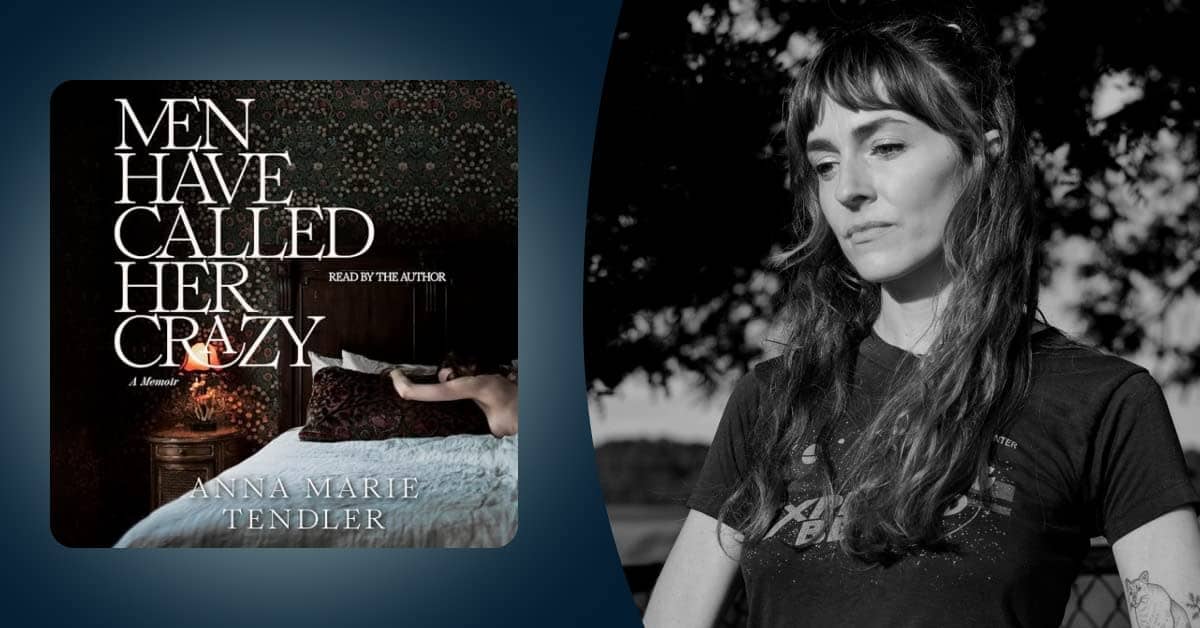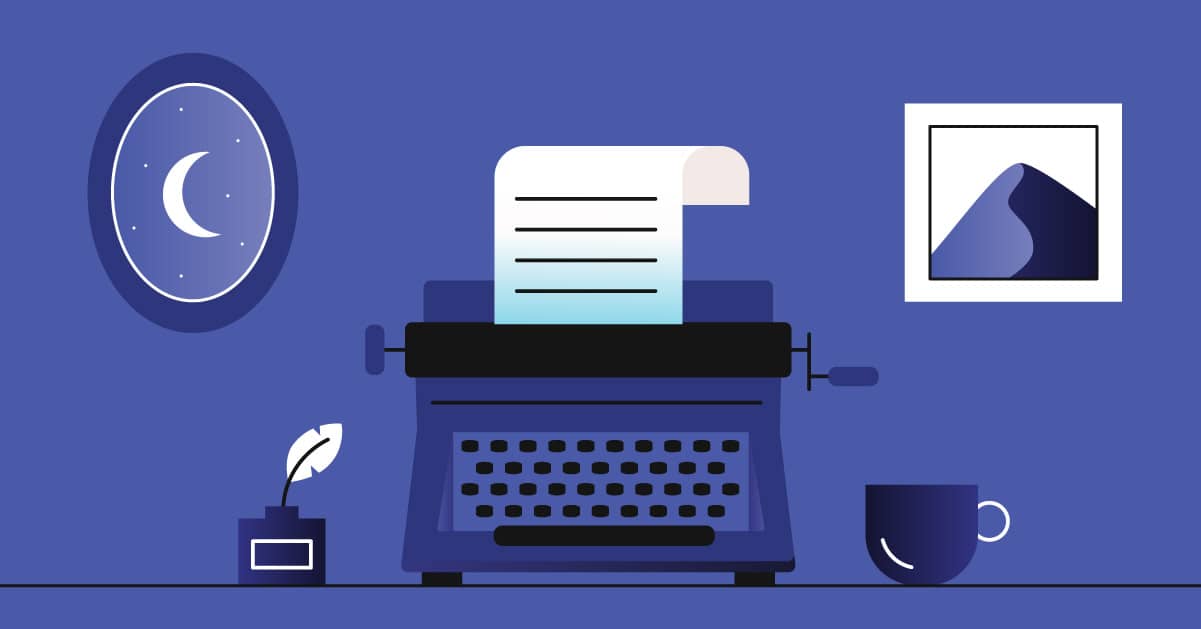This post was originally published on Audible.com.
Even if you haven't seen multimedia artist Anna Marie Tendler's haunting, grimly beautiful photography collection "Rooms in the First House" or her fine textile work specializing in Victorian lampshades, it's quite likely you know her name. It's possible even still, that despite this awareness, that name is tethered to a since-dissolved marriage, a relationship whose end was endlessly mulled over in the public consciousness.
It's part of the strength and appeal of her debut memoir, Men Have Called Her Crazy, then, that Tendler pointedly refuses to go the route of dangling tantalizing details or tell-all scandals. Instead, she offers listeners a deeply intimate recollection of inpatient treatment for mental health struggles including anxiety, self-harm, depression, and disordered eating. Throughout, she considers the ways in which men have altered her perception of self and reality, punctuating the narrative with painful moments that became mounting traumas. Shortly after the book's release, Tendler joined me to share her thoughts on writing, her story's unique format, and the advice she'd give her younger self.
Alanna McAuliffe: Prior to the release of Men Have Called Her Crazy, much of your art has been in the visual medium, including photography, textile work, and cosmetology. How did you find the process of excavating, writing, and then narrating such deeply personal stories from your own life in the literary medium compared to these other formats?
Anna Marie Tendler: With writing, I really felt the weight of language. I believe language is so important. It can do both beautiful and destructive things. In visual mediums you can rely on ambiguity of meaning, but it is much harder to do that with words. The excavating didn’t feel difficult. All those moments were right there waiting for me to take them from the liminal to the concrete. They were things I had already worked through and processed, so while I was able to embody the emotions of them on the page, they weren’t triggering to write down.
But I wanted to get the language right; that was important to me. I also wanted to trust the listener to make some of their own inferences, much like they would when taking in a visual-based work, like a photograph. I think it’s really important to trust the listener to extrapolate some of the book’s meaning on their own. Narrating the audiobook was an absolute stress-free joy. I loved it! I got to retell these stories exactly how I heard them. It was truly so fun.
"I wanted to show my mistakes, my missteps, my wrong turns, my misguided assumptions, my mental health struggles, and my lessons learned in hopes of portraying womanhood in all its messy reality."
As the title of your book alludes to, you examine the intersection of gender and mental health, exploring ways in which patriarchy often complicated your self-perception and coming-of-age. If you had to give any advice or words of warmth to a younger version of yourself navigating such relationships and interactions, what would they be?
This advice pertains to romantic relationships. I would tell myself that you have no control over anyone’s actions or feelings but your own. You can’t force anyone to change their opinion of you, you can’t force anyone to love you, you can’t force anyone to meet you where you are if they aren’t ready to. This took me 37 years to learn, but once I did, I was free of the patriarchal forces that caused me to contort my true self in favor of holding together my heterosexual romantic relationships.
Speaking of younger versions of yourself, your memoir takes on a fascinating nonlinear format, zeroing in on moments and memories from the course of your life, flowing forwards and backwards in time. What inspired you to tell your story in this unique way?
This was a device I learned from fiction. Whenever I have read (or listened to!) books that jump between stories or timelines from chapter to chapter, it has a way of propelling the reader forward with urgency. You read one chapter and then a second and then you have to read the third to find out what happens in the storyline from chapter one. Then you have to read the fourth chapter to pick up the storyline from chapter two. But you haven’t forgotten about the original storyline, so you need to read the fifth chapter to get back there. This has a cascading effect that as a reader I have always loved.
"I also wanted to trust the listener to make some of their own inferences, much like they would when taking in a visual-based work, like a photograph. I think it’s really important to trust the listener to extrapolate some of the book’s meaning on their own."
To be frank, because I like to be real about the insecurities of writing, I wasn’t confident at first that this technique would work with my book. I hoped it would but I didn’t know for sure. I don’t think I realized until I was halfway through writing that I could pull it off.
In recent years, you’ve endured so much speculation and faulty or incomplete assumptions about your personal life. Did you find that the act of writing your memoir also offered an opportunity at reclaiming your voice and narrative? How did it feel to put so much of yourself on the page free from others' influence?
Mostly yes, with just a pinch of no. I wrote this book as unselfconsciously as I could. I wanted to show my mistakes, my missteps, my wrong turns, my misguided assumptions, my mental health struggles, and my lessons learned in hopes of portraying womanhood in all its messy reality. I think social media has a way of feeding us stability, happiness, financial security, and career success that in real life may be a very different story. In this way, I absolutely felt a reclaiming of myself. I am an imperfect person who is trying her best. I believe most people are.
This all said, Men Have Called Her Crazy didn’t stop the people who want to make faulty or incomplete assumptions about me from doing so. But I was never going to please those people, and this book was never going to satisfy them.
Thank you for being so generous with sharing your story of navigating the intricacies of mental illness, treatment, recovery, and the ebb-and-flow of wellness. What do you hope listeners—many of whom might be struggling in similar ways—ultimately find and take away?
I hope people see some of their own experiences reflected in my book, and that might provide comfort in knowing that so many of us deal with the same struggles. Emotions have a way of making us feel like we are the only people in the world having them, and while situations differ greatly from person to person, I really believe we all experience core emotions very similarly. That notion makes me feel so much less isolated when I’m feeling down or anxious—that there are others who share in my emotional experience. I also hope it allows people to see that—and I’m going to boldly use a cliché that would surely disappoint my editor!—there is light at the end of the tunnel. Treatment and recovery are nonlinear, some days are good, some are bad, but ultimately and cumulatively, the days do trend upwards.
Your memoir takes its place in the pantheon of tremendously vulnerable glimpses into the realities of living through the ups and downs of one’s mental wellbeing. Are there any audiobooks or podcasts that you’ve listened to that explore similar themes or that have otherwise inspired you in the forging or writing of your own story?
I’m not sure there are any audiobooks or podcasts that specifically inspired me to write my personal story. In fact, while I was brainstorming what Men Have Called Her Crazy would be and while I was writing, I decided not to take in any other media—be it audiobooks, podcasts, or books—that were memoir or mental health-based.
"Treatment and recovery are nonlinear, some days are good, some are bad, but ultimately and cumulatively, the days do trend upwards."
That said, I have learned so much and have been deeply inspired by audiobooks and podcasts that take the raw material of people’s lives and with care turn it into a narrative that is both interesting and makes you want to keep listening. I guess this is my way of saying audiobooks and podcasts have taught me a lot about storytelling. A few of my favorite examples of this in podcast form are You Must Remember This by Karina Longworth, Exposed: The Ashley Madison Hack, and Root of Evil: The True Story of the Hodel Family and the Black Dahlia. For audiobooks with exceptional storytelling, I love How to Murder Your Life by Cat Marnell and The House of Gucci by Sara Gay Forden.




